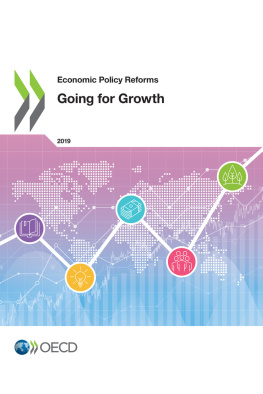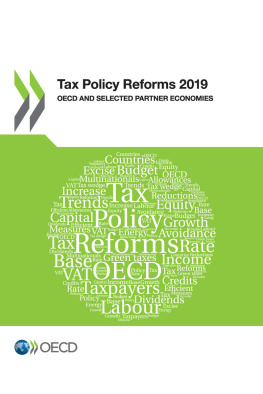OECD - Economic Policy Reforms 2019
Here you can read online OECD - Economic Policy Reforms 2019 full text of the book (entire story) in english for free. Download pdf and epub, get meaning, cover and reviews about this ebook. year: 2019, publisher: OECD Publishing, genre: Politics. Description of the work, (preface) as well as reviews are available. Best literature library LitArk.com created for fans of good reading and offers a wide selection of genres:
Romance novel
Science fiction
Adventure
Detective
Science
History
Home and family
Prose
Art
Politics
Computer
Non-fiction
Religion
Business
Children
Humor
Choose a favorite category and find really read worthwhile books. Enjoy immersion in the world of imagination, feel the emotions of the characters or learn something new for yourself, make an fascinating discovery.
Economic Policy Reforms 2019: summary, description and annotation
We offer to read an annotation, description, summary or preface (depends on what the author of the book "Economic Policy Reforms 2019" wrote himself). If you haven't found the necessary information about the book — write in the comments, we will try to find it.
OECD: author's other books
Who wrote Economic Policy Reforms 2019? Find out the surname, the name of the author of the book and a list of all author's works by series.
Economic Policy Reforms 2019 — read online for free the complete book (whole text) full work
Below is the text of the book, divided by pages. System saving the place of the last page read, allows you to conveniently read the book "Economic Policy Reforms 2019" online for free, without having to search again every time where you left off. Put a bookmark, and you can go to the page where you finished reading at any time.
Font size:
Interval:
Bookmark:

OECD (2019), Economic Policy Reforms 2019: Going for Growth , OECD Publishing, Paris, https://doi.org/10.1787/aec5b059-en .
The information in this document with reference to Cyprus relates to the southern part of the Island. There is no single authority representing both Turkish and Greek Cypriot people on the Island. Turkey recognises the Turkish Republic of Northern Cyprus (TRNC). Until a lasting and equitable solution is found within the context of the United Nations, Turkey shall preserve its position concerning the Cyprus issue.
The Republic of Cyprus is recognised by all members of the United Nations with the exception of Turkey. The information in this document relates to the area under the effective control of the Government of the Republic of Cyprus.
Globalisation, digitalisation, ageing and environmental degradation are the megatrends shaping tomorrows living standards and well-being. The prospects look weak in the absence of renewed reform dynamism. The global economy is facing further headwinds, with growth weakening in the wake of high trade uncertainty. At the same time, gains in living standards, as measured by GDP per capita, have been much slower since the Great Financial Crisis. All this should prompt policy makers to implement necessary reforms to deliver on stronger, more inclusive and environmentally-sustainable growth and help people make the most out of opportunities created in this new world.
This 2019 Going for Growth edition offers policy makers a set of country-specific reform priorities to prepare for the future and turn mega-trend challenges into opportunities, for all.
Looking back at reform achievements over the past two years gives a contrasted picture. Although the overall pace of reforms has returned to the modest pre-crisis pace, a number of countries have managed to implement major reforms reforms that respond directly to past Going for Growth priorities.
Significant examples include reforms to lift employment and make the labour market more inclusive. France improved collective wage bargaining and legal certainty for dismissals, reformed the rules for unemployment insurance and increased in-work benefits. Japan took steps to improve childcare provision and new laws on overtime work to improve work-life balance.
Regulatory simplification and tax policy have also been used to support firms investment and growth, but also provide governments with necessary resources for redistribution. The United States has cut corporate income tax rates and reformed business taxation a long-standing Going for Growth priority. India implemented a landmark tax reform with the introduction of its Goods and Services Tax. Other countries, such as Greece, Poland and Spain took significant measures to improve tax collection. Several countries took measures to facilitate firm entry and level the playing field for businesses by reducing red tape, deregulating professional services and network sectors as well as by reinforcing competition authorities.
Governments have also intensified reform efforts to tackle social challenges. Greece and Italy rolled-out nationwide anti-poverty schemes. India finalised the connection of all its villages to electricity and launched a national health protection scheme targeting 100 million poor families. China made progress on bridging the rural-urban divide in its health care system by increasing the portability of health insurance.
These reforms are already improving the lives of millions. Yet, there is more to do, and Going for Growth reflects OECDs expert judgement on where policy makers need to focus reform actions to deliver sustainable and inclusive growth for future generations.
The reform priorities to boost inclusive growth differ across countries. Education is the most common reform priority and is crucial to make sure current and future generations find employment, which would both boost productivity and give everyone the best chance for a fulfilling life. A significant number of recommendations in the area of education focus on improving the targeting of resources to disadvantaged students and schools, for example in many European and Latin American countries, as well as the United States. Upgrading school infrastructure is a recommendation in emerging-market economies such as India and South Africa.
Both growth and equal opportunities will also benefit from addressing labour market segmentation and improving the labour market inclusion of women, migrants, minorities and older workers - another set of top Going for Growth priorities, in particular in Europe, but also in the United States, Japan and several emerging-market economies..
Tax reform, with increasing reliance on property taxation, is a pro-growth priority in many, particularly advanced economies. Better public sector efficiency, rule of law and adequate, accessible infrastructure provision are equally important to save resources, access markets and create conditions for businesses to invest in innovation, in particular, but not only in emerging-market economies.
Where countries have tended to lag behind is product market reforms. Reforms are often difficult and granular in implementation, but opening up markets to entry, competition and foreign trade and investment are essential for innovation, the diffusion of digital technologies and ultimately productivity growth and social inclusion. Such reforms remain among the most frequent Going for Growth priorities.
Going for Growth guides policy makers where to focus their reform efforts for the well-being of their citizens and to achieve strong, sustainable, balanced and inclusive growth. However, some priorities require a co-ordinated effort by all countries. Examples include trade openness, intellectual property rights, taxation of multinational enterprises, migration, climate change, oceans and waste. As such, they are a useful reminder of the benefits of multilateral co-operation.
Font size:
Interval:
Bookmark:
Similar books «Economic Policy Reforms 2019»
Look at similar books to Economic Policy Reforms 2019. We have selected literature similar in name and meaning in the hope of providing readers with more options to find new, interesting, not yet read works.
Discussion, reviews of the book Economic Policy Reforms 2019 and just readers' own opinions. Leave your comments, write what you think about the work, its meaning or the main characters. Specify what exactly you liked and what you didn't like, and why you think so.



















